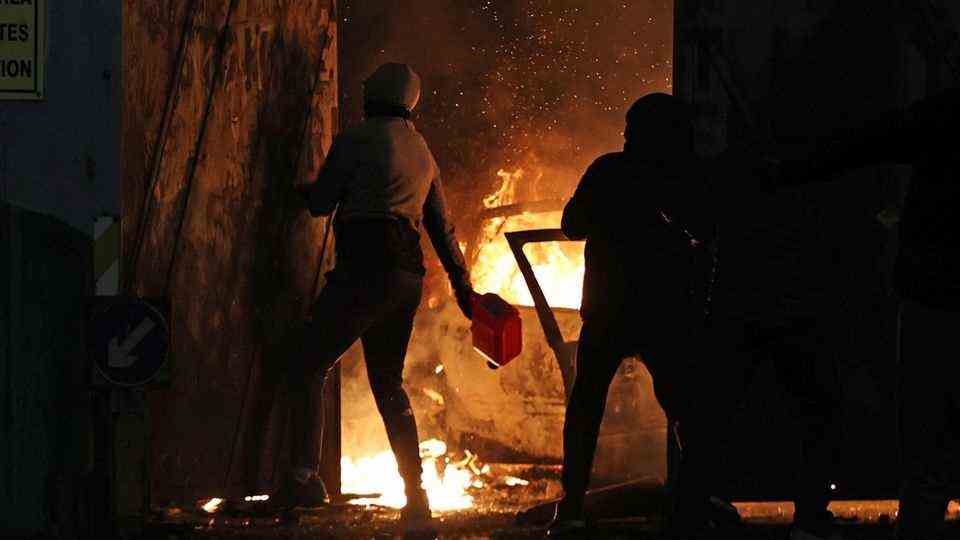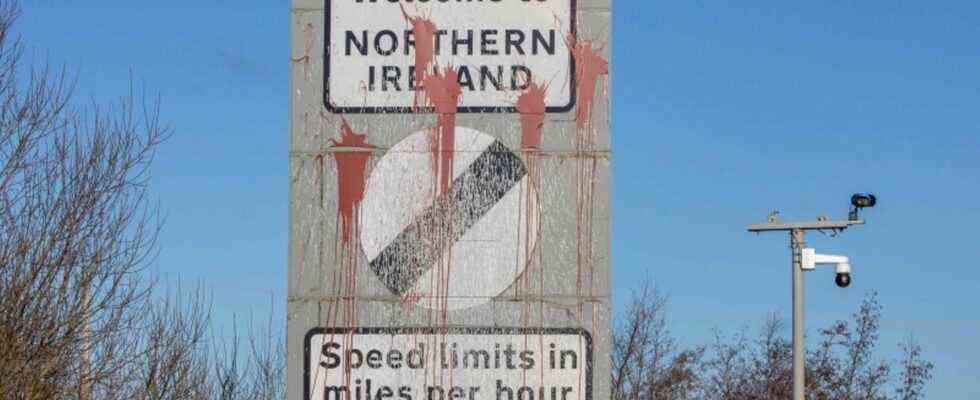After Brexit and the sausage dispute
Northern Ireland: Customs rules are fueling the mood between Great Britain and the EU
A Northern Ireland Protocol, which is part of the Brexit Treaty, is intended to prevent border controls from becoming necessary at the inner-Irish border.
© Paul Faith / AFP
Customs rules, dealing with the inner-Irish border and the role of the European Court of Justice – after Brexit, Northern Ireland’s position continues to cause tensions.
Great Britain’s exit from the EU was officially completed at the beginning of last year. The British are no longer part of the political community and the common internal market. However, the position of the British province of Northern Ireland in the new relationship between London and Brussels continues to cause considerable tensions. An overview:
Why is?
The Irish island consists of the Republic of Ireland, which remains part of the EU, and the British province of Northern Ireland. The latter was the scene of the bloody Northern Ireland conflict between mostly Protestant and pro-British Unionists and mostly Catholic supporters of reunification with the Republic of Ireland until the 1990s. The conflict was resolved with the Good Friday Agreement of 1998, which was made possible in particular thanks to the membership of both Ireland and Great Britain in the EU.
A Northern Ireland Protocol, which is part of the Brexit Treaty, is now intended to prevent border controls becoming necessary at the inner-Irish border as a result of the British exit. Because, according to both London and Brussels, this could lead to a resurgence of violence.
What is the current arrangement?
According to the Northern Ireland Protocol, the British province belongs politically to the United Kingdom, but remains de facto in the European single market. This means that the necessary goods controls in exchange with Great Britain must take place at the maritime border in the Irish Sea. British Customs is responsible for the controls.
For the application of these provisions, transitional periods were provided even after the completion of Brexit in order to guarantee the technical installation of the goods controls. The government in London has unilaterally extended the transitional rules for certain products in recent months and postponed the start of controls indefinitely.
What is London asking for?
On the British side, large parts of the ruling Conservative Tories and the Northern Irish Unionists were against the Northern Ireland Protocol from the start. They denounce the creation of a de facto border within the UK. The pro-British unionists particularly fear that Northern Ireland will draw closer to the Irish Republic. The so-called sausage dispute over rules for imports of British fresh meat products into Northern Ireland had fueled criticism in recent months.
Prime Minister Boris Johnson and his Brexit Minister David Frost, who had laboriously negotiated the protocol in the years of tug-of-war with the EU, have now switched to the course of their party colleagues. You accuse the EU of interpreting the provisions of the protocol too strictly and are calling for fundamental changes. Otherwise, they want to terminate the agreement entirely.
How does the EU feel about this?
Brussels has put an infringement procedure against Great Britain that was initiated in the course of repeated unilateral suspensions of the transitional rules for customs controls on hold and has declared its readiness for further negotiations. The EU Commission rejects a fundamental renewal of the Northern Ireland Protocol. This also includes, for example, the almost complete elimination of customs controls between Northern Ireland and Great Britain, which is required by London.
Another point of contention is the role of the European Court of Justice (ECJ), which, according to the Northern Ireland Protocol, is to rule in the last instance in customs disputes relating to Northern Ireland. London wants to change that. For Brussels, however, curtailing the jurisdiction of the ECJ is out of the question.

What’s next?
From EU diplomatic circles it was said that patience with London was running out. Brussels will not go beyond the offer of the EU Commission expected on Wednesday to facilitate the flow of goods within the framework of the protocol.
However, a failure of the negotiations and a termination of the Northern Ireland Protocol by Great Britain would also have serious consequences for the EU. In this case, for example, it could impose punitive tariffs on British products, and there is a risk of an open trade war. The political consequences in Northern Ireland are also hardly foreseeable.

